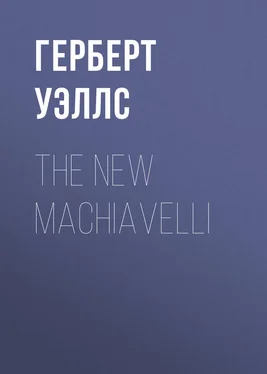Герберт Уэллс - The New Machiavelli
Здесь есть возможность читать онлайн «Герберт Уэллс - The New Machiavelli» — ознакомительный отрывок электронной книги совершенно бесплатно, а после прочтения отрывка купить полную версию. В некоторых случаях можно слушать аудио, скачать через торрент в формате fb2 и присутствует краткое содержание. Жанр: foreign_prose, foreign_sf, на английском языке. Описание произведения, (предисловие) а так же отзывы посетителей доступны на портале библиотеки ЛибКат.
- Название:The New Machiavelli
- Автор:
- Жанр:
- Год:неизвестен
- ISBN:нет данных
- Рейтинг книги:3 / 5. Голосов: 1
-
Избранное:Добавить в избранное
- Отзывы:
-
Ваша оценка:
- 60
- 1
- 2
- 3
- 4
- 5
The New Machiavelli: краткое содержание, описание и аннотация
Предлагаем к чтению аннотацию, описание, краткое содержание или предисловие (зависит от того, что написал сам автор книги «The New Machiavelli»). Если вы не нашли необходимую информацию о книге — напишите в комментариях, мы постараемся отыскать её.
The New Machiavelli — читать онлайн ознакомительный отрывок
Ниже представлен текст книги, разбитый по страницам. Система сохранения места последней прочитанной страницы, позволяет с удобством читать онлайн бесплатно книгу «The New Machiavelli», без необходимости каждый раз заново искать на чём Вы остановились. Поставьте закладку, и сможете в любой момент перейти на страницу, на которой закончили чтение.
Интервал:
Закладка:
He boasted he took no exercise, and also of his knowledge of port wine. Of other wines he confessed quite frankly he had no “special knowledge.” Beyond these things he had little pride except that he claimed to have read every novel by a woman writer that had ever entered the Union Library. This, however, he held to be remarkable rather than ennobling, and such boasts as he made of it were tinged with playfulness. Certainly he had a scholar’s knowledge of the works of Miss Marie Corelli, Miss Braddon, Miss Elizabeth Glyn and Madame Sarah Grand that would have astonished and flattered those ladies enormously, and he loved nothing so much in his hours of relaxation as to propound and answer difficult questions upon their books. Tusher of King’s was his ineffectual rival in this field, their bouts were memorable and rarely other than glorious for Codger; but then Tusher spread himself too much, he also undertook to rehearse whole pages out of Bradshaw, and tell you with all the changes how to get from any station to any station in Great Britain by the nearest and cheapest routes…
Codger lodged with a little deaf innocent old lady, Mrs. Araminta Mergle, who was understood to be herself a very redoubtable Character in the Gyp-Bedder class; about her he related quietly absurd anecdotes. He displayed a marvellous invention in ascribing to her plausible expressions of opinion entirely identical in import with those of the Oxford and Harvard Pragmatists, against whom he waged a fierce obscure war…
It was Codger’s function to teach me philosophy, philosophy! the intimate wisdom of things. He dealt in a variety of Hegelian stuff like nothing else in the world, but marvellously consistent with itself. It was a wonderful web he spun out of that queer big active childish brain that had never lusted nor hated nor grieved nor feared nor passionately loved, – a web of iridescent threads. He had luminous final theories about Love and Death and Immortality, odd matters they seemed for him to think about! and all his woven thoughts lay across my perception of the realities of things, as flimsy and irrelevant and clever and beautiful, oh! – as a dew-wet spider’s web slung in the morning sunshine across the black mouth of a gun…
4
All through those years of development I perceive now there must have been growing in me, slowly, irregularly, assimilating to itself all the phrases and forms of patriotism, diverting my religious impulses, utilising my esthetic tendencies, my dominating idea, the statesman’s idea, that idea of social service which is the protagonist of my story, that real though complex passion for Making, making widely and greatly, cities, national order, civilisation, whose interplay with all those other factors in life I have set out to present. It was growing in me – as one’s bones grow, no man intending it.
I have tried to show how, quite early in my life, the fact of disorderliness, the conception of social life as being a multitudinous confusion out of hand, came to me. One always of course simplifies these things in the telling, but I do not think I ever saw the world at large in any other terms. I never at any stage entertained the idea which sustained my mother, and which sustains so many people in the world, – the idea that the universe, whatever superficial discords it may present, is as a matter of fact “all right,” is being steered to definite ends by a serene and unquestionable God. My mother thought that Order prevailed, and that disorder was just incidental and foredoomed rebellion; I feel and have always felt that order rebels against and struggles against disorder, that order has an up-hill job, in gardens, experiments, suburbs, everything alike; from the very beginnings of my experience I discovered hostility to order, a constant escaping from control.
The current of living and contemporary ideas in which my mind was presently swimming made all in the same direction; in place of my mother’s attentive, meticulous but occasionally extremely irascible Providence, the talk was all of the Struggle for Existence and the survival not of the Best – that was nonsense, but of the fittest to survive.
The attempts to rehabilitate Faith in the form of the Individualist’s LAISSEZ FAIRE never won upon me. I disliked Herbert Spencer all my life until I read his autobiography, and then I laughed a little and loved him. I remember as early as the City Merchants’ days how Britten and I scoffed at that pompous question-begging word “Evolution,” having, so to speak, found it out. Evolution, some illuminating talker had remarked at the Britten lunch table, had led not only to man, but to the liver-fluke and skunk, obviously it might lead anywhere; order came into things only through the struggling mind of man. That lit things wonderfully for us. When I went up to Cambridge I was perfectly clear that life was a various and splendid disorder of forces that the spirit of man sets itself to tame. I have never since fallen away from that persuasion.
I do not think I was exceptionally precocious in reaching these conclusions and a sort of religious finality for myself by eighteen or nineteen. I know men and women vary very much in these matters, just as children do in learning to talk. Some will chatter at eighteen months and some will hardly speak until three, and the thing has very little to do with their subsequent mental quality. So it is with young people; some will begin their religious, their social, their sexual interests at fourteen, some not until far on in the twenties. Britten and I belonged to one of the precocious types, and Cossington very probably to another. It wasn’t that there was anything priggish about any of us; we should have been prigs to have concealed our spontaneous interests and ape the theoretical boy.
The world of man centred for my imagination in London, it still centres there; the real and present world, that is to say, as distinguished from the wonder-lands of atomic and microscopic science and the stars and future time. I had travelled scarcely at all, I had never crossed the Channel, but I had read copiously and I had formed a very good working idea of this round globe with its mountains and wildernesses and forests and all the sorts and conditions of human life that were scattered over its surface. It was all alive, I felt, and changing every day; how it was changing, and the changes men might bring about, fascinated my mind beyond measure.
I used to find a charm in old maps that showed The World as Known to the Ancients, and I wish I could now without any suspicion of self-deception write down compactly the world as it was known to me at nineteen. So far as extension went it was, I fancy, very like the world I know now at forty-two; I had practically all the mountains and seas, boundaries and races, products and possibilities that I have now. But its intension was very different. All the interval has been increasing and deepening my social knowledge, replacing crude and second-hand impressions by felt and realised distinctions.
In 1895 – that was my last year with Britten, for I went up to Cambridge in September – my vision of the world had much the same relation to the vision I have to-day that an ill-drawn daub of a mask has to the direct vision of a human face. Britten and I looked at our world and saw – what did we see? Forms and colours side by side that we had no suspicion were interdependent. We had no conception of the roots of things nor of the reaction of things. It did not seem to us, for example, that business had anything to do with government, or that money and means affected the heroic issues of war. There were no wagons in our war game, and where there were guns, there it was assumed the ammunition was gathered together. Finance again was a sealed book to us; we did not so much connect it with the broad aspects of human affairs as regard it as a sort of intrusive nuisance to be earnestly ignored by all right-minded men. We had no conception of the quality of politics, nor how “interests” came into such affairs; we believed men were swayed by purely intellectual convictions and were either right or wrong, honest or dishonest (in which case they deserved to be shot), good or bad. We knew nothing of mental inertia, and could imagine the opinion of a whole nation changed by one lucid and convincing exposition. We were capable of the most incongruous transfers from the scroll of history to our own times, we could suppose Brixton ravaged and Hampstead burnt in civil wars for the succession to the throne, or Cheapside a lane of death and the front of the Mansion House set about with guillotines in the course of an accurately transposed French Revolution. We rebuilt London by Act of Parliament, and once in a mood of hygienic enterprise we transferred its population EN MASSE to the North Downs by an order of the Local Government Board. We thought nothing of throwing religious organisations out of employment or superseding all the newspapers by freely distributed bulletins. We could contemplate the possibility of laws abolishing whole classes; we were equal to such a dream as the peaceful and orderly proclamation of Communism from the steps of St. Paul’s Cathedral, after the passing of a simply worded bill, – a close and not unnaturally an exciting division carrying the third reading. I remember quite distinctly evolving that vision. We were then fully fifteen and we were perfectly serious about it. We were not fools; it was simply that as yet we had gathered no experience at all of the limits and powers of legislation and conscious collective intention…
Читать дальшеИнтервал:
Закладка:
Похожие книги на «The New Machiavelli»
Представляем Вашему вниманию похожие книги на «The New Machiavelli» списком для выбора. Мы отобрали схожую по названию и смыслу литературу в надежде предоставить читателям больше вариантов отыскать новые, интересные, ещё непрочитанные произведения.
Обсуждение, отзывы о книге «The New Machiavelli» и просто собственные мнения читателей. Оставьте ваши комментарии, напишите, что Вы думаете о произведении, его смысле или главных героях. Укажите что конкретно понравилось, а что нет, и почему Вы так считаете.











